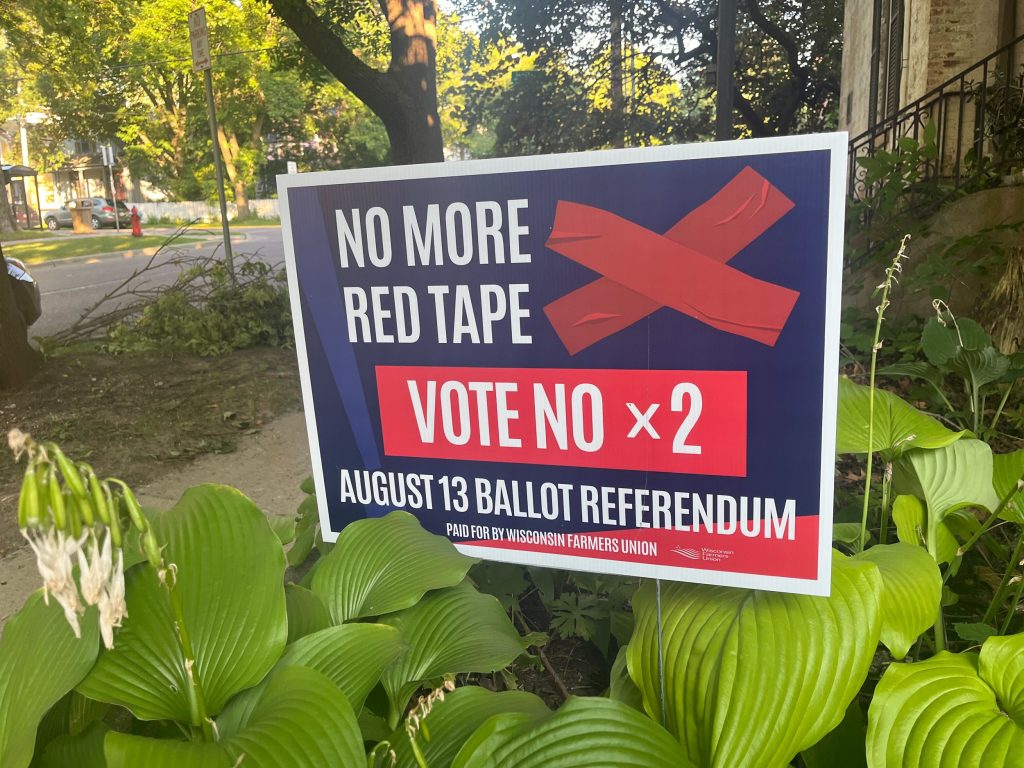Evers Bypasses Legislature in Battle Over Funding Long-Term Care
Governor using federal funds to revive blocked plan to aid struggling care providers.

A yard sign urges a no vote for two constitutional amendment questions on Tuesday’s primary ballot. Matthew DeFour / Wisconsin Watch
Gov. Tony Evers earlier this month announced a plan to spend $258 million in pandemic relief to increase Medicaid reimbursements to long-term care providers — a proposal previously halted by the Legislature’s Republican budget-writing committee.
The Democrat’s move kept long-term care, among other issues affecting families, in the middle of his tug of war with the Republican-controlled Legislature over spending authority. While a July Wisconsin Supreme Court ruling gave more leeway to the Evers administration, the outcome of a Tuesday vote on two constitutional amendment questions could shift some power back to the Legislature.
A yes vote on both questions would restrict the governor’s ability to allocate emergency federal funds without legislative approval.
Those votes and the outcome of any squabbling over Evers’ plan to boost compensation for long-term care providers will shape the spending power of each branch of government.
Evers’ Medicaid reimbursement increase is among few — if not the only — active statewide efforts to rescue long-term care providers as they endure challenges that threaten their service to elderly residents and people with disabilities.
As the proportion of Wisconsin’s senior population has grown in recent years, so has a crisis in the industry that cares for them. Low state reimbursement rates through Medicaid, the joint state and federal aid program to help low-income residents afford care, have depressed provider revenue and worker pay. That has fueled workforce shortages and facility closures that severely limit options for seniors and disabled adults who can’t afford to privately pay for care.
Assisted living facilities on average pay caregivers between $17 and $20 an hour. State reimbursements assume caregivers make just $13 an hour, Mike Pochowski, president and CEO of the Wisconsin Assisted Living Association, said earlier this year.
The increase would come from a pool of pandemic relief aid that the federal government sent to the state health department specifically for assisted living and home-based care industries.
The Wisconsin Department of Health Services earlier this year sought to increase Medicaid payments to providers. But doing so first required review from the Republican-controlled Joint Committee on Finance.
That additional legislative oversight resulted from an effort by former Republican Gov. Scott Walker and allies to erode gubernatorial power during a lame-duck session in late 2018 before Evers succeeded him.
Walker signed a series of laws that increased the oversight authority of several legislative committees. That included giving the finance committee veto power over administration proposals to significantly increase Medicaid reimbursements.
The finance committee refused to schedule a hearing on the latest proposal after a member anonymously objected in April, blocking it from implementation. Committee leaders say they worry about the annual $103 million general revenue cost of maintaining higher Medicaid reimbursement rates once pandemic relief runs out.
Finance committee co-chair Rep. Mark Born, R-Beaver Dam, told Wisconsin Watch and WPR that the Legislature already made substantial investments in long-term care in the three most recent state budgets.
Committing the amount of money requested by the health department halfway through a budget cycle is “exceptionally rare,” Born said in a statement.
As the proposal sat, the Wisconsin Supreme Court ruled the finance committee could not legally block spending on conservation projects initiated by the governor’s administration.
The ruling may have emboldened Evers to move ahead on the reimbursement increase despite the finance committee’s inaction.
“Unfortunately, Republican lawmakers had objected to that plan and subsequently failed to take further action,” Evers communications director Britt Cudaback wrote in a statement to WPR and Wisconsin Watch. “Thus, the governor directed DHS to do it anyway using federal funds already allocated to the department.”
Tuesday’s constitutional amendment vote could affect those dynamics.
Although vague language in the proposed amendment creates ambiguity over the full scope of the potential, a yes vote would certainly grant the Legislature more authority over spending previously held by the executive branch, said Philip Rocco, an associate professor of political science at Marquette University.
One possible outcome: Governors and the departments they oversee could no longer make decisions about federal emergency dollars, such as boosting compensation to care providers, without the Legislature’s oversight.
While the amendments are most clearly aimed at power over undesignated and unanticipated federal dollars, they could impact other types of funding, said Bryna Godar, a staff attorney at University of Wisconsin Law School’s State Democracy Research Initiative.
Split party control between the Legislature and governorship means Wisconsin residents can expect continued legal fights over the scope of the Legislature’s power regardless of Tuesday’s election outcome, Rocco said.
Asked for his reaction to the administration’s move, Joint Finance Committee Co-chair Sen. Howard Marklein, R-Spring Green, wrote in an email to WPR and Wisconsin Watch: “We have had a productive dialogue with DHS on this topic and I had hoped that we would come to an agreement. I look forward to continuing the discussion during the budget process next session.”
The federal pandemic funds that Evers allocated for the rate hike last through March 2025. The Legislature will control any future changes through the next two-year budgeting process that culminates in July 2025.
Evers’ plans to increase reimbursement rates beginning in October 2024 make political sense, Rocco said.
“It is a lot harder to repeal something than it is to stop it from being enacted in the first place.”
Nearly two-thirds of assisted living providers would see reimbursement rate increases of about 40 percent while three in four supportive home care providers would see increases of about 16 percent — raises that many providers say they can’t afford to lose.
Long-term care caught up in Wisconsin government’s battle over spending power was originally published by Wisconsin Public Radio.
If you think stories like this are important, become a member of Urban Milwaukee and help support real, independent journalism. Plus you get some cool added benefits.





















